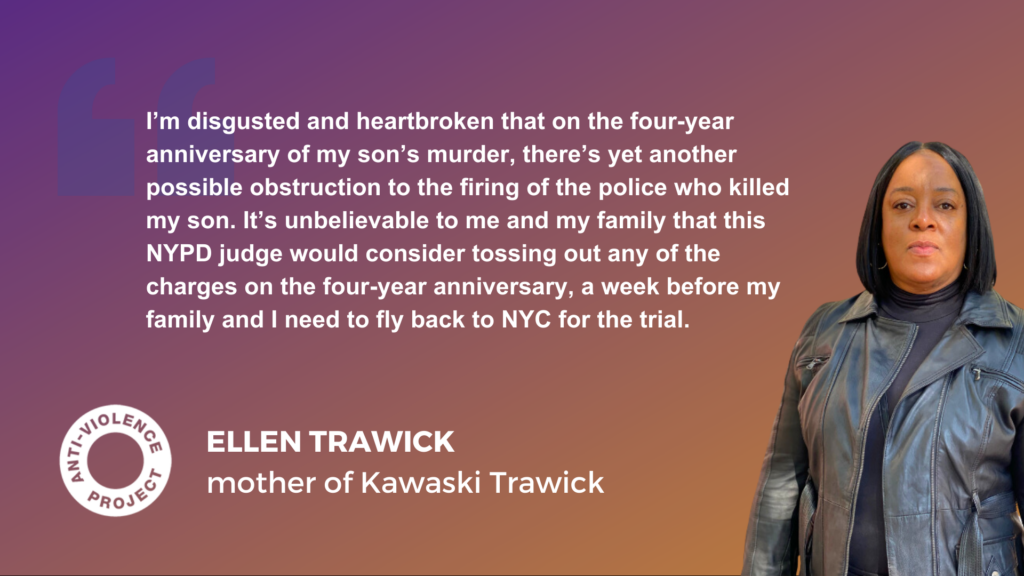FOR IMMEDIATE RELEASE- Friday, April 14, 2023
MEDIA CONTACTS
Kristine Mikkelsen, kmikkelsen@spitfirestrategies.com, 908.304.4869
Eliel Cruz, press@justicecommittee.org, 770.608.8725
Orie Givens, communications@avp.org, 212.416.5603
New York – Today, exactly four years to the day that Kawaski Trawick, a Black gay New Yorker, was killed by NYPD officers in his own home – and a week before the discipline trial is scheduled to begin – Trawick’s family learned that an NYPD judge is considering dismissing one of the charges, which could undermine the overall discipline trial.
The Trawick family learned late this Friday afternoon that NYPD Deputy Commissioner of Trials, Rosemarie Maldonado – who is overseeing the discipline trial for NYPD Officers Brendan Thompson and Herbert Davis – is considering the possibility of dismissing a discipline charge related to the illegal entry and trespass by Officer Herbert Davis. Although there were no exigent circumstances when Davis and Thompson arrived at Trawick’s apartment, Davis used his baton to break the chain on Trawick’s door to push the door open and gain entry into the apartment. NYPD Deputy Commissioner Maldonado has given the CCRB and the defense attorneys until Monday to submit written arguments on the matter.
“I’m disgusted and heartbroken that on the four-year anniversary of my son’s murder, there’s yet another possible obstruction to the firing of the police who killed my son,” said Ellen Trawick, mother of Kawaski Trawick. “It’s unbelievable to me and my family that this NYPD judge would consider tossing out any of the charges on the four-year anniversary, a week before my family and I need to fly back to NYC for the trial. The video was clear – Kawaski was cooking in his home when Davis used his baton to break the chain holding Kawaski’s door closed and they busted in without his permission and proceeded to murder him in 112 seconds. The judge shouldn’t entertain this kind of change at this stage, especially since the officers were charged two years ago – in 2021.”
“Just because cops don’t arrest each other for trespass and illegal entry doesn’t mean it’s legal, and just because police routinely act with impunity it doesn’t mean that they are above the law,” said Loyda Colon, Executive Director of the Justice Committee. “Brendan Thompson and Herbert Davis killed Kawaski in 112 seconds, escalating something that should not have been a situation into a crisis, and then refused to render any medical attention to save his life. Just the idea that the NYPD is considering dismissing any charges at this late stage is outrageous. We hope Deputy Commissioner Maldonado does the right thing and allows all current charges to stand – Thompson and Davis both need to be fired.”
Background: On April 14, 2019, Kawaski Trawick locked himself out of his apartment while he was cooking. The fire department let Mr. Trawick back into his apartment. Mr. Trawick was cooking in his home after the situation had been resolved when NYPD Officers Thompson and Davis illegally entered Mr. Trawick’s apartment and killed him in 112 seconds.
After tasing and shooting Mr. Trawick, neither of the officers attempted to administer emergency medical aid. They closed the door to Kawaski’s apartment, then stood outside, leaving Mr. Trawick to bleed out on the floor.
This discipline trial for both officers is scheduled to begin on April 24, 2023. Civil employees in New York state generally do not face disciplinary action after 18 months from an incident. However, police are often not charged with disciplinary misconduct charges within 18 months. In order to discipline police for misconduct after 18 months, criteria for a “crime exception” must be met which means that misconduct charges must have penal code equivalents. Since the NYPD has historically failed to bring discipline charges against officers who have killed or brutalized New Yorkers within the 18-month period, the few instances where formal disciplinary action has been taken is often outside of the 18-month period, following the “crime exception”.


